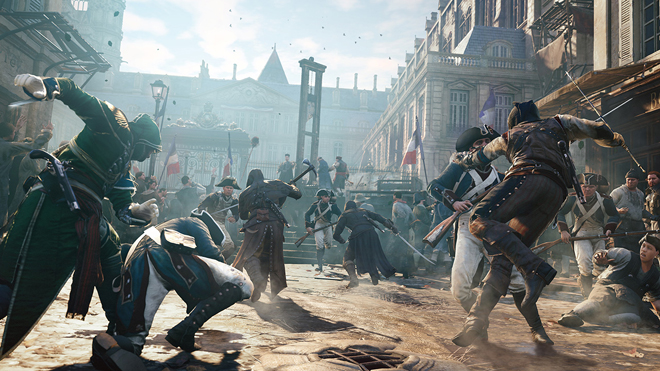Examples of Damage Control in Gaming: When Games Get Political

There weren’t many surprises at this past E3 in terms of game announcements, something you might have realized if you followed the event this year. It’s a sure sign that we’re in the mid-gen doldrums period, but that’s not to downplay the few there were. The Xbox One X’s choice of name and sticker price qualified as one, along with the announcement of Monster Hunter: World, the reemergence of Beyond Good and Evil 2 (and the unexpected form it took), and Nintendo proving that Metroid is still alive after all. But it was mellower than previous years, thanks to E3 slowly shifting from a press-focused event to one similar to the PAX (Penny Arcade Expo) events.
Instead, the surprises emerged from conversations around video games and the gaming world, as some developers are getting gutsier with the themes their titles will be tackling as they become more realistic. Weirdly enough, though, some are trying their damnedest not to let the gaming audience know precisely how gutsy they’ll get. This is about politics in video games.
While the mere utterance of “politics” will make many of us think of dirty government dealings and corruption these days, it’s been taboo when related to video games for a short while longer, often not for good reasons. There’s nothing complicated about games getting political, when they tackle themes that mimic events that either occurred or are occurring in the real world. While some actually take place in realistic facsimiles of our world, others happen in fantasy environments, but also contain events that often subtly mimic themes like political dealings, religious themes, and racism. But when a certain crowd constantly says politics should be kept out of games, they’re often referring to things they don’t want to hear. Someone should tell them their view of “politics” is misguided, but they’re often too stubborn to listen.
Gamers making such a foolish mistake is one issue, but it’s another when developers do the same. And I’m not talking about indie developers, but veterans who damn well know better, and apparently have to play the part of being ignorant.

Take Quantic Dream’s David Cage, for instance, who previously handled Heavy Rain and Beyond: Two Souls, and is currently working on the next PlayStation-exclusive adventure game: Detroit: Become Human. Previous trailers showed how this title would tackle the relationship between humans and androids, but the E3 2017 trailer showed how political it will get. So, it was alarming when Cage didn’t want to discuss those aspects when asked by Kotaku, and said its story will merely be about androids discovering their emotions and longing to be free. He also claimed it wouldn’t have an overly political message. But upon seeing that trailer and reading about the themes it will tackle, that’s nonsense.
The t trailer that opens with a black android singing an old negro spiritual, for game which depicts a world where androids are forced to ride in the back of the bus. It will also feature protests and riots, some of which will cause serious environmental destruction. That’s already enough to establish parallels to historical segregation, and it’s laying those themes on thick. I get the feeling Cage is aware of this, but is choosing to hide it because of the audience that becomes irrationally upset whenever politics and video games are so much as mentioned in tandem. He even outright says it’s a game about civil rights in his interview with Polygon. There will undoubtedly be more content in the game that qualifies.

This can also somewhat be applied to Reggie Fils-Aime of Nintendo of America, who deflected the question of whether Nintendo’s games tackle politics. In fairness, he has more of a point, as Nintendo’s games aren’t quite as political as other games, since many of them target kids and families. When they do contain politics, they’re subtler about it. Take Mayor Pauline from the upcoming Super Mario Odyssey, for instance, a woman who originated from the old Donkey Kong games who’s traded her trademark dress for a pants suit. That sounds reminiscent of other female politicians, but there’s nothing overly political about that. There’s also this line, which is funny given how crazy the world has become in recent memory; but again, that’s subtle.
If you want to discuss Nintendo games that gets political, there’s the Advance Wars series, which contained numerous nods to battles and figures involved in World War II. But I guess there’s a reason why the series is dead. If Metroid can be revived, maybe there’s a chance this could return too.
Both examples raise a necessary question: When will we get to the point where politics in games is nothing to be ashamed of? Or perhaps the question I should ask is whether we’ll ever get there. It’s a little humorous and incredibly mind-boggling to see how deathly afraid of their audience some developers are, something previously seen when GamerGate and other similar groups in the last few years rose to prominence. It’s long past time for developers to stop pussyfooting around this, but it’s clear they’re not ready to address this firsthand at the moment, and I can’t predict when they will be.
But I sincerely hope that moment will arrive someday, because the video gaming medium will go to some creative places once developers are honest with themselves and their audience. Whether we’ll get there is another issue, since the fear of developers (especially those involved with AAA games) losing even a portion of their audience is high, but it will be an interesting development to pay attention to that will hopefully come to a welcome conclusion.





